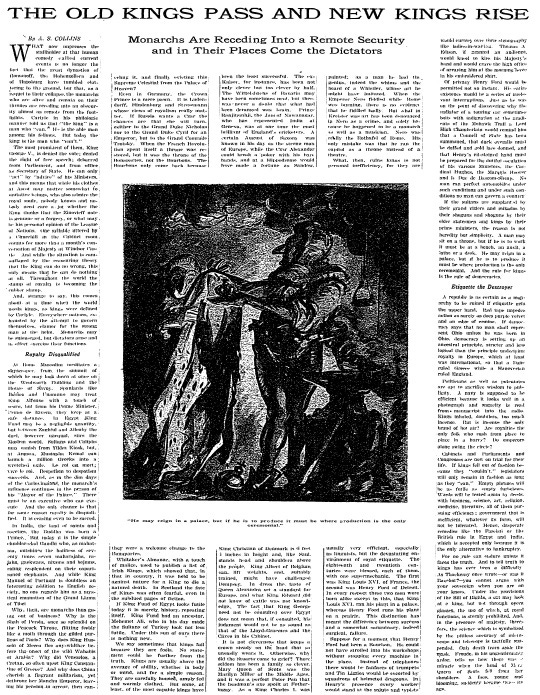The Old Kings Pass and New Kings Rise
Today, we think of royalty running nations or empires as a distant memory. But in 1924, the phenomenon was new enough that New York Times Magazine wrote about it with the sub-headline: "Monarchs Are Receding Into a Remote Security and in Their Places Come the Dictators."
As journalist A.S. Collins wrote, the likes of Italy's Mussolini and Russia's Trotsky were now reigning supreme:
At Rome Mussolini meditates a skyscraper, from the summit of which he may look down at once on the Woolworth Building and the House of Savoy.
...
If Russia wants a Czar the chances are that she will turn, neither to the Grand Duke Nicholas nor to the Grand Duke Cyril for an Emperor, but to the Grand Comrade Trotsky.
And this was several years before the rise of Germany's Hitler. Collins still referenced the country in their article, just with other individuals at the helm:
Even in Germany, the Crown Prince is a mere pawn. It is Ludendorff, Hindenburg, and Stresenann whose views of royalism really matter.
Who?
Erich Ludendorff was a German military officer turned later leader of the Nazi's rise to power.
Paul von Hindenburg led the German army in World War I and later became president from 1925-34, during which time he appointed Hitler as chancellor in 1933.
Gustav Stresemann was German chancellor in 1923, then foreign minister from 1923-29, and 1926 Nobel Peace Prize co-winner for negotiating a peace treaty between Germany and France. (Which, obviously, later proved short-lived.)
So why was royalty receding and political leaders, particularly dictators, rising around 1924? Collins speculated that much of it had to do with industrialization and new technologies:
If the sultans are supplanted by their grand viziers and mikados by their shoguns and shoguns by their elder statesmen and kings by their prime ministers, the reason is not heredity but simplicity. A man may sit on a throne, but if he is to work it must be at a bench, an anvil, a lathe, or a desk. He may reign in a palace, but if he is to produce it must be where production is only ceremonial.
...
King Louis XVI ran his plant in a palace, whereas Henry Ford runs his plant on a prairie. This distinction has meant the difference between success and a somewhat sanguinary, indeed surgical, failure.
...
In the presence of majesty, therefore, the science which is symbolized by the pitiless accuracy of microscope and telescope is tactfully suspended. Only death tears aside the mask.
Just this week, the man who is arguably the Henry Ford of our time – both for his technological and industrial innovation as well as his anti-Semitic comments – is Elon Musk. He has attained a level of unofficial political power himself, helping turn congressional Republicans against a short-term government funding extension earlier this week after posting his disapproval on X, leading Democrats to call him "President Musk." (The legislative package was later amended and passed on Friday.)
The Old Kings Pass and New Kings Rise: Monarchs Are Receding Into a Remote Security and in Their Places Come the Dictators
Published: Sunday, December 21, 1924


